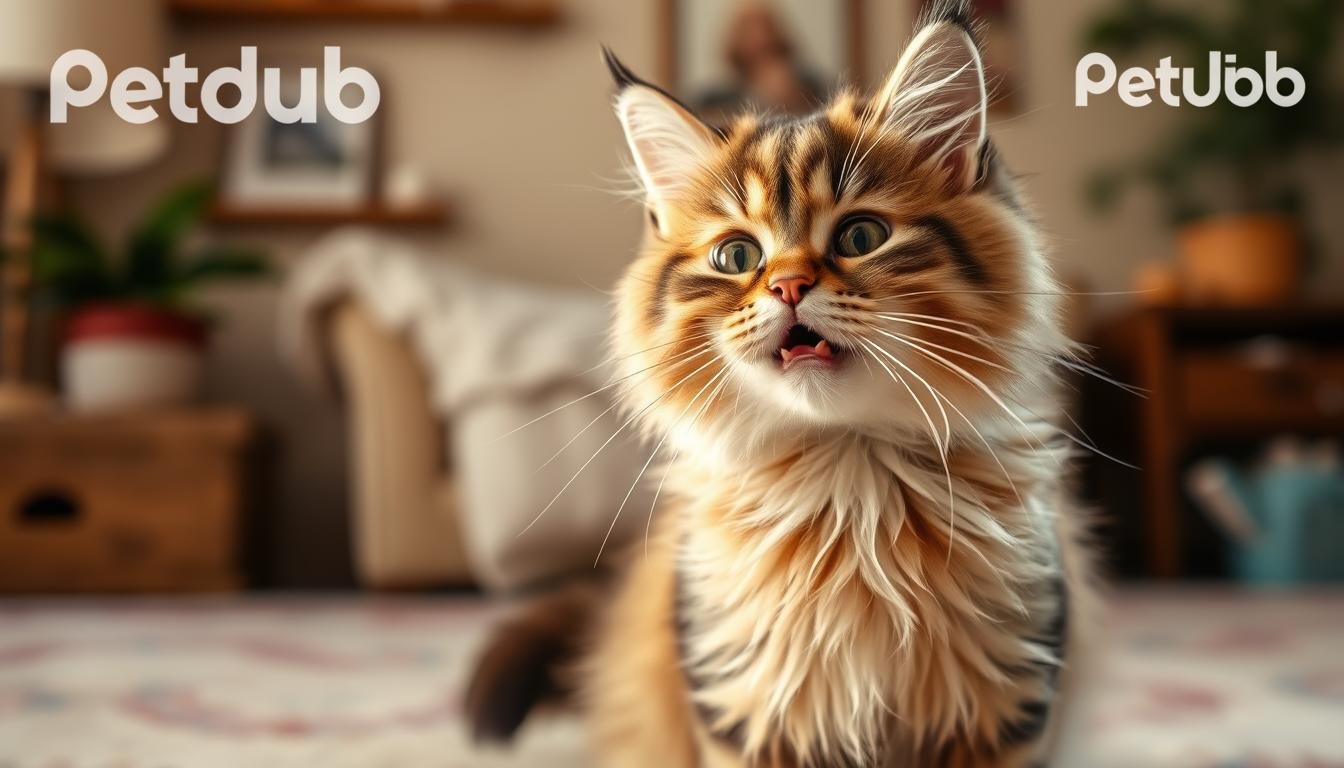Why Is My Cat Sneezing? Did you know cats can sneeze up to 5 times a day? While occasional sneezes are normal, frequent sneezing might mean there’s a health issue. In this guide, we’ll look at why cats sneeze and what you can do about it.
We’ll cover everything from minor irritants to serious health problems. Whether it’s allergies, infections, or environmental factors, we’ve got the answers. We’re here to help you understand and address your cat’s sneezing.
Key Takeaways
- Cat sneezing is a common occurrence, with the average cat sneezing up to 5 times per day.
- Persistent or excessive sneezing in cats can signify an underlying health issue, such as respiratory infections, allergies, or irritants.
- Understanding the potential causes of cat sneezing is crucial to addressing the problem and ensuring your feline friend’s wellbeing.
- This guide will provide you with comprehensive information on the common causes of cat sneezing and offer guidance on what to do.
- Seeking veterinary care is recommended if your cat’s sneezing persists or is accompanied by other concerning symptoms.
Understanding Cat Sneezing
Cat sneezing is a common and natural occurrence in felines. It’s a reflex that helps expel irritants or foreign matter from the nasal passages. This keeps your cat’s respiratory system healthy and clear. Understanding the reasons behind this behavior can provide valuable insights into your pet’s wellbeing.
What is Cat Sneezing?
Sneezing in cats is a sudden, involuntary expulsion of air from the nose and mouth. It’s typically a response to the presence of dust, pollen, or other particles. These particles have entered the nasal cavity and triggered the body’s defense mechanism. Sneezing helps clear these irritants, preventing them from causing further discomfort or respiratory issues.
Why Do Cats Sneeze?
Cats sneeze for a variety of reasons, including Cat Sneezing Causes such as respiratory infections, allergies, irritants, and even foreign objects lodged in the nose. By understanding the underlying causes, you can better address your cat’s sneezing. This ensures their overall health and well-being.
- Respiratory infections, both viral and bacterial, can lead to increased sneezing and other symptoms like nasal congestion or discharge.
- Allergies, either to environmental factors or household products, can trigger a sneezing response in cats.
- Irritants like dust, pet dander, or strong odors can also cause cats to sneeze as a way to expel the offending particles.
- Foreign objects, such as a blade of grass or small object, can become lodged in the nasal cavity and induce sneezing.
Understanding the underlying causes of Cat Sneezing Causes is the first step in addressing the issue. It ensures your cat’s comfort and health. By recognizing the signs and seeking veterinary care when necessary, you can help keep your feline friend happy and healthy.
Feline Respiratory Infections
Feline respiratory infections are a common reason for sneezing in cats. These infections, both viral and bacterial, can cause a range of symptoms. It’s important to understand the different types and their treatments to keep our cats healthy.
Viral Infections in Cats
The Feline Herpesvirus is a common viral infection that causes sneezing in cats. It leads to inflammation in the upper respiratory tract. This can cause sneezing, nasal discharge, and eye problems. Another viral infection, Feline Calicivirus, also causes similar respiratory issues.
Bacterial Infections in Cats
Bacterial infections like Bordetella and Chlamydia felis can also cause respiratory problems in cats. These infections lead to inflammation and irritation in the nasal passages and sinuses. This can result in persistent sneezing and other respiratory distress.
| Viral Infections | Bacterial Infections |
|---|---|
| Feline Herpesvirus | Bordetella |
| Feline Calicivirus | Chlamydia felis |
When dealing with Feline Respiratory Infections or Upper Respiratory Infections in Cats, quick veterinary care is key. The right treatment, which may include medications or supportive care, can help manage symptoms. It can also prevent the condition from getting worse.
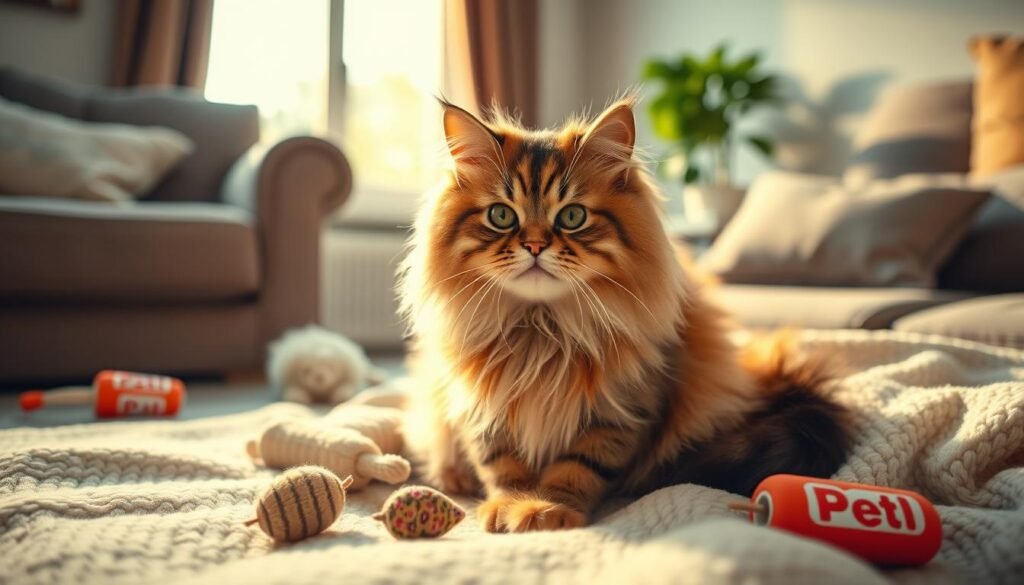
Cat Allergies
Cats can get allergies, which might make them sneeze a lot. It’s important to know what allergens can bother them. This helps keep your cat’s nose from getting irritated.
Environmental allergens like pollen, dust mites, and mold can bother cats. These particles can make their noses itch and sneeze. Cats might also react to things in their home, like cleaning products or their litter.
- Pollen from plants and trees
- Dust mites
- Mold spores
- Household cleaning products
- Cat litter
Finding out what’s making your cat sneeze can be hard. But, your vet can help. They might do tests or try different things to find the problem.
After finding the allergen, you can start treating it. This might include medicines, changing their environment, or making lifestyle changes. Your vet will tell you the best ways to help your cat feel better and sneeze less.
“Recognizing and addressing cat allergies is an important step in ensuring your feline friend’s overall health and well-being.”
Irritants for Cats
Cats can be very sensitive to their surroundings. Things like dust, pollen, and common household items can make them sneeze. Knowing what might upset them helps keep them happy and healthy.
Environmental Irritants
Outdoor allergens, like pollen, can really bother cats. Indoor allergens, like dust and mold, can also make them sneeze. Keeping your home clean and well-ventilated helps reduce their exposure.
Household Products
Many everyday items can irritate cats. Things like strong-smelling cleaning products and certain litters can be a problem. Choosing fragrance-free, pet-safe options is best for their sensitive noses.
| Environmental Irritants | Household Products |
|---|---|
|
|
Being aware of irritants in your cat’s world can help them sneeze less. A happy, healthy cat is a joy to have around!
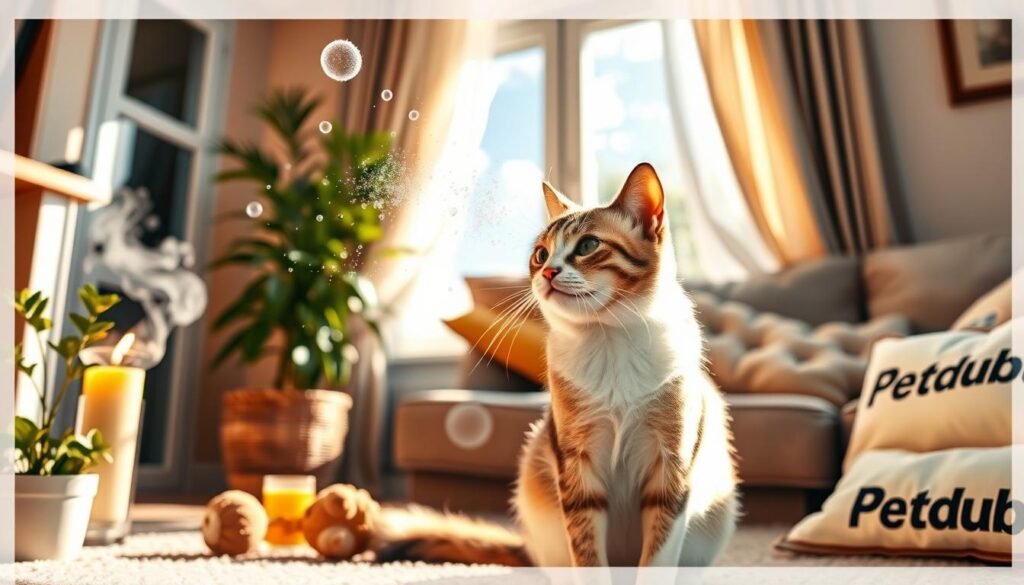
“Keeping your home clean and using pet-safe products can go a long way in preventing irritant-induced sneezing in cats.”
Upper Respiratory Infections in Cats
Upper respiratory infections are common in cats. They affect the nose, sinuses, and throat. Symptoms include sneezing, nasal congestion, and more. It’s important to know how to treat these infections to keep our cats healthy.
Viral infections like feline herpesvirus and calicivirus cause many upper respiratory issues. These viruses spread quickly. Bacterial infections can also occur, often after a viral infection or due to poor air quality or stress.
- Symptoms of upper respiratory infections in cats may include:
- Sneezing
- Nasal discharge (clear, yellow, or green)
- Congestion
- Coughing
- Fever
- Loss of appetite
Managing upper respiratory infections in cats often involves medication and supportive care. A warm, humid environment and plenty of fluids help. Keeping the cat’s nasal passages clean also aids in recovery.
“Early diagnosis and treatment are crucial for upper respiratory infections in cats, as these conditions can quickly become severe and even life-threatening if left unchecked.”
Working with your vet is key to treating your cat’s upper respiratory issues. With the right care, most cats recover fully and regain their health.
Chronic Cat Sneezing
If your cat sneezes a lot, it might mean they have a health issue. We’ll look at why cats sneeze a lot and when to see a vet.
Underlying Causes
There are many reasons why cats sneeze a lot. These include:
- Respiratory infections, such as feline viral rhinotracheitis or bacterial infections
- Allergies to things like pollen, dust, or household products
- Irritants in the cat’s environment, such as strong scents or chemicals
- Nasal blockages or foreign objects lodged in the nose
It’s crucial to work with your vet to find out why your cat sneezes a lot. The treatment will depend on the cause.
When to See a Vet
If your cat sneezes a lot for more than a few days, or shows other symptoms like a runny nose or lethargy, see a vet. Your vet can check your cat, do tests if needed, and treat the cause.
Seeing a vet early is important. Chronic or untreated respiratory issues can get worse. Working with your vet can help your cat feel better and stop sneezing.
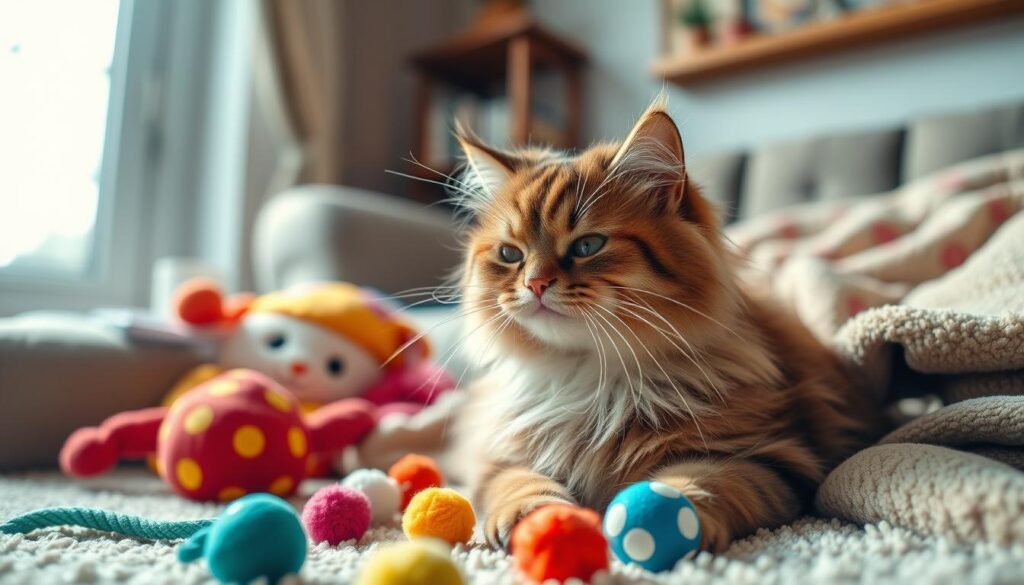
Nasal Blockage in Cats
Nasal blockages can cause cats to sneeze a lot. These blockages can come from many things, like swelling or foreign objects. Knowing why cats get nasal congestion helps us care for them better.
Causes of Nasal Blockages
Nasal blockages in cats can happen for several reasons, including:
- Inflammation: Things like upper respiratory infections, allergies, or chronic inflammation can swell up the nasal passages.
- Polyps: These are noncancerous growths in the nasal cavities that block airflow and cause sneezing.
- Foreign Objects: Cats might breathe in small things like grass awns or plant material, blocking their nasal passages.
These blockages can make it hard for cats to breathe. They might sneeze a lot, have nasal discharge, or have trouble breathing.
Recognizing the Signs
If your cat has a nasal blockage, you might see these signs:
- Persistent, frequent sneezing
- Nasal congestion or discharge, which may be clear, colored, or even bloody
- Difficulty breathing or labored breathing
- Decreased appetite or reluctance to eat
- General lethargy or discomfort
If you see these signs in your cat, get them to the vet fast. The vet can check them out and figure out the best treatment for the nasal blockage.
By knowing why cats get nasal blockages and watching for symptoms, we can help them breathe better. This keeps our furry friends healthy and happy.
Foreign Objects in Cat Nose
Cats are naturally curious, which can sometimes lead to trouble. They might accidentally breathe in or get something stuck in their nose. This can make them very uncomfortable and even hurt their breathing. We’ll look at what kinds of things might get stuck in a cat’s nose and what signs to watch for.
Common Foreign Objects
Small toys, plant bits, and insects are common things that might get stuck in a cat’s nose. These can cause big problems for our furry friends. Being careful and taking steps to prevent can help keep them safe.
Symptoms and Signs
Cats with something stuck in their nose might show some worrying signs. These include:
- Persistent sneezing or sniffling
- Nasal discharge, which may be clear, colored, or even bloody
- Difficulty breathing or labored breathing
- Head shaking or pawing at the face
- Decreased appetite or reluctance to eat
If you see any of these signs in your cat, get them to the vet right away. Quick action can fix the problem and prevent worse issues.
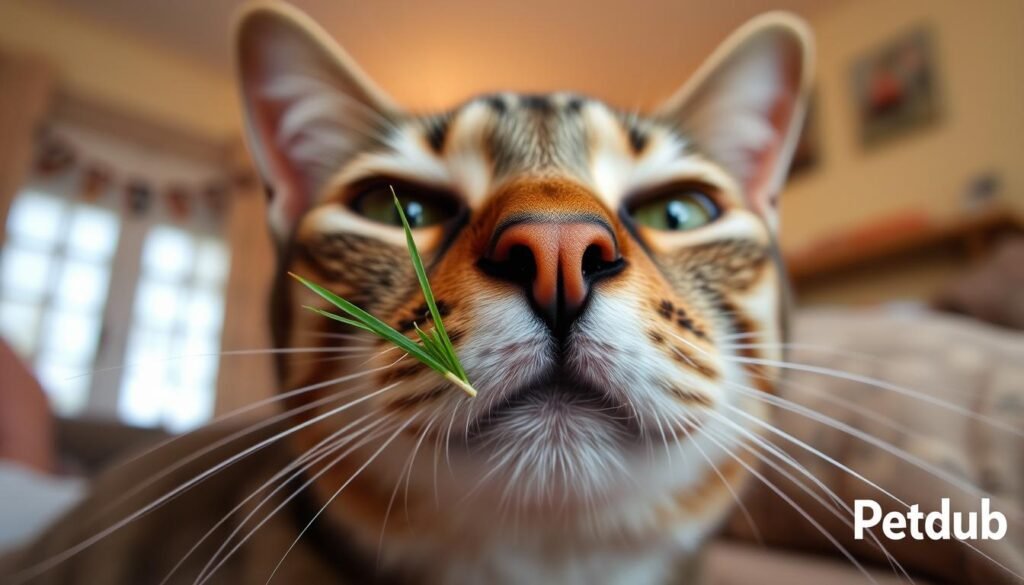
Keeping a close eye on your cat and taking steps to prevent them from breathing in foreign objects is key. Knowing what might cause trouble and spotting the signs early can help keep your cat healthy and happy.
Environmental Triggers for Cat Sneezing
As pet owners, we know cats sneeze for many reasons. Viral infections and allergies are common, but so are environmental factors. Let’s look at the main environmental triggers and how we can help our cats breathe better.
Seasonal Allergies
Cats can get seasonal allergies just like humans do. They might sneeze more in spring or when pollen counts are high. Keeping your home clean and using air purifiers can help reduce their exposure to allergens.
Indoor Allergens
Indoor spaces can also cause sneezing in cats. Dust, dander, and household cleaners can be culprits. Vacuuming regularly, using hypoallergenic litter, and choosing pet-safe cleaners can help.
“Identifying and addressing environmental triggers is key to managing recurring cat sneezing.”
Being aware of environmental triggers can help make your home healthier for your cat. If your cat’s sneezing doesn’t stop or is severe, see a vet for help.
Cat Sneezing Causes
When our feline friends start sneezing, we wonder what’s causing it. Cat sneezing can be due to many things. These include respiratory infections, allergies, and environmental irritants. Knowing what causes cat sneezing helps us care for our pets better.
Respiratory infections are a common cause. These infections can make the upper respiratory tract inflamed and irritated. Viruses like feline herpesvirus and feline calicivirus often cause this. Bacterial infections, such as Bordetella or Chlamydia, can also lead to sneezing.
Allergies are another reason for sneezing in cats. Cats can be allergic to things like dust, pollen, or chemicals in the home. These allergies can make the nasal passages inflamed, causing sneezing.
Environmental irritants can also cause sneezing. Products like air fresheners or cleaners can irritate a cat’s nose. Strong smells or smoke can also make cats sneeze.
In some cases, sneezing can be a sign of a bigger health issue. This could be a deviated septum, nasal polyps, or even cancer. If your cat’s sneezing doesn’t stop or is with other symptoms, see a vet.
- Viral or bacterial respiratory infections
- Allergies to environmental allergens
- Exposure to irritants like household products or strong scents
- Underlying health conditions, such as nasal blockages or polyps
Understanding Cat Sneezing Causes helps us help our cats. If your cat is sneezing a lot, talk to your vet. They can give you advice and care for your pet.

Diagnosing the Cause of Cat Sneezing
To find out why your cat sneezes a lot, your vet will do a detailed check-up. They might suggest different tests to figure out the cause. This could be due to Feline Respiratory Infections, Cat Allergies, or Nasal Blockage in Cats.
Physical Examination
Your vet will carefully look at your cat’s nose, throat, and breathing system. They’re searching for signs of swelling, discharge, or any other issues that might cause sneezing. They might also press on your cat’s sinuses to see if it hurts.
Diagnostic Tests
Based on what they find, your vet might suggest some tests. These could include:
- Blood tests to check for Feline Respiratory Infections or allergies
- Nasal swabs to test for bacterial or viral infections
- X-rays or CT scans to detect Nasal Blockage in Cats or other structural issues
- Allergy testing to identify environmental or food-related triggers
By doing a physical exam and specific tests, your vet can create a good treatment plan. This plan will help your cat feel better and stop sneezing.
“Accurately diagnosing the root cause of a cat’s sneezing is the first step towards providing effective treatment and relief.”
It’s very important to work with your vet to keep your cat healthy. With the right steps, you can help your cat breathe better and avoid any serious problems.
Treating Cat Sneezing
Once you know why your cat is sneezing, your vet can suggest treatments. These might include medicines or home remedies to help your cat feel better.
Medication
Your vet might give your cat medicine for Feline Respiratory Infections, Cat Allergies, or Irritants. Some common medicines are:
- Antihistamines to reduce inflammation and manage allergy symptoms
- Decongestants to clear nasal congestion
- Antibiotics to fight bacterial infections
- Anti-inflammatory drugs to reduce swelling and discomfort
It’s crucial to follow your vet’s advice and finish the treatment. This ensures your cat gets the best care.
Home Remedies
There are also home remedies to help your cat’s sneezing:
- Humidify the air: Use a humidifier or place your cat’s bed in a steamy bathroom to help soothe dry nasal passages.
- Clean the litter box regularly: Scoop clumps and change the litter frequently to minimize dust and irritants.
- Provide a clean, dust-free environment: Vacuum regularly and avoid using harsh cleaning products that may trigger sneezing.
- Consider a cat-safe air purifier: This can help remove airborne allergens and irritants that may be causing your cat’s sneezing.
While home remedies can offer quick relief, it’s vital to work with your vet. They can help find and treat the real cause of your cat’s sneezing.
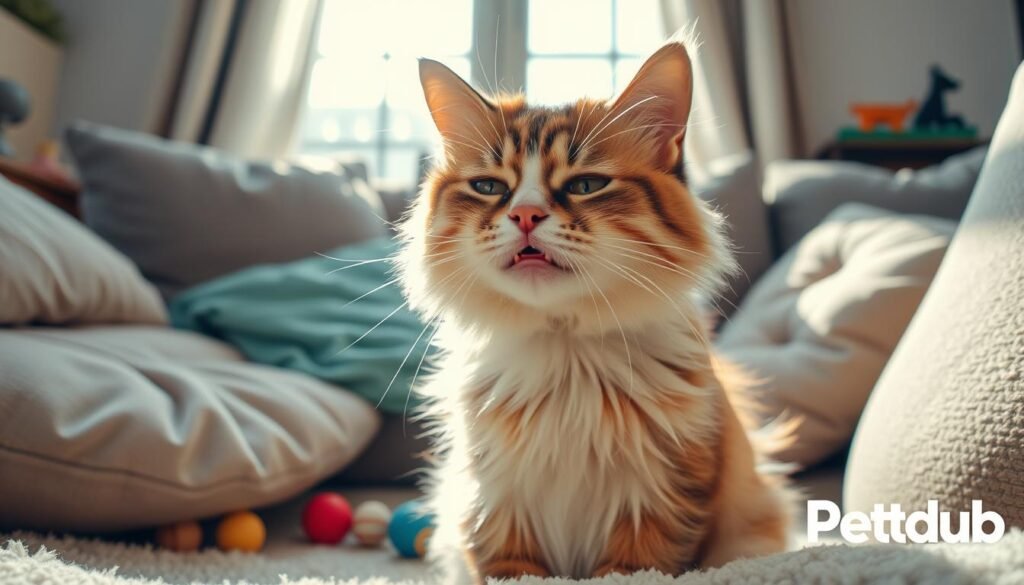
| Medication | Purpose |
|---|---|
| Antihistamines | Reduce inflammation and manage allergy symptoms |
| Decongestants | Clear nasal congestion |
| Antibiotics | Fight bacterial infections |
| Anti-inflammatory drugs | Reduce swelling and discomfort |
“Treating the underlying cause is key to addressing your cat’s sneezing and ensuring their long-term comfort and health.”
Preventing Cat Sneezing
To keep your cat’s sneezing in check, we’ll look at ways to manage their environment and regular vet visits. By tackling environmental triggers and keeping up with your cat’s health, you can reduce sneezing fits.
Environmental Control
One important step is controlling your cat’s environment. Start by removing any irritants or allergens from your home. This means:
- Regularly cleaning litter boxes and replacing litter
- Vacuuming and dusting often to cut down on dust and dander
- Avoiding strong smells from cleaning products, air fresheners, or candles
- Ensuring good air flow in your cat’s living areas
Regular Vet Checkups
Regular veterinary checkups are also crucial. Your vet can spot any health issues, like respiratory infections or allergies, and treat them. They might also suggest ways to prevent sneezing in the future.
“Regular check-ups and monitoring can help catch any potential issues early, allowing for timely intervention and better management of your cat’s sneezing.”
By focusing on your cat’s environment and health, you can lessen sneezing. Stay alert, work with your vet, and aim for a sneeze-free home for you and your cat.
Pet Wellness: Keeping Your Furry Friends Healthy
Conclusion
Cat sneezing can be caused by many things, from small irritations to serious health issues. By knowing the common causes, we can keep our cats comfortable and healthy. If your cat sneezes a lot or shows other signs of illness, see a vet.
While sneezing now and then is okay, too much sneezing can mean trouble. Watching our cats closely helps us catch health problems early. This way, we can give them the care they need to stay happy and healthy.
Cat sneezing is common, but it’s key to know why it happens and how to help. Working with our vets and taking steps to prevent problems can make our cats’ lives better. This way, they can live a happy and fulfilling life.

